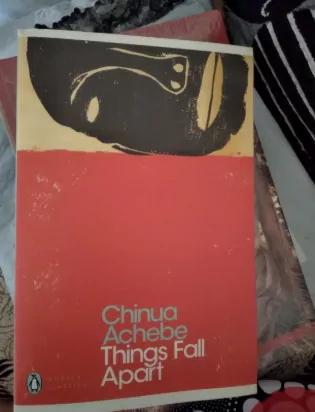
Things fall apart is a small, easy-to-read book. It depicts traditional African lifestyles in the late 19th century.
Chinua Achebe, the author, has divided the book into 3 parts.
The first part focuses on the culture and religious beliefs of the clans. It begins with the introduction of Okonkwo, one of the clan leaders.
The story shows most interestingly how the men acquire their titles. Without the title, the villagers consider men unworthy of respect and feminine.
They also consider innocent children as cursed who born with defects. A man is considered respectful if he has wives not short of 3.
Such and more are the harsh customs of the people of Umuofia clan.
The second and third part focuses on how the British colonialists wormed their way into their culture.
They slowly seized different parts of the village strategically. British tried to convert the Unuofians into Christians and succeeded often.
They challenged their Gods and brought in a new form of government and jurisdiction. And, British punished anyone who challenged their decisions.
Before we dive into the plot, let me introduce you to some of the characters.
Table of Contents
About the Author: Chinua Achebe (1930-2013)

Chinua Achebe was an Igbo Nigerian novelist, poet, professor. and critic.
His parents raised him in the Igbo town of Ogidi in southeastern Nigeria. Achebe excelled at school and went on to win scholarships to study medicine.
But he later changed his major to Literature at University College. He became fascinated with world religions and traditional African cultures.
Achebe started writing stories when he was a college student. He later joined Nigerian Broadcasting Service (NBS) and moved to the metropolis, Lagos.
Achebe gained worldwide attention for his debut novel ‘Things fall apart’ and its sequels. He writes his novels in English.
Achebe defends this by claiming that it is the ‘Language of the Colonialists.’
Main Characters of Things Fall Apart:
Okonkwo is one of the clan leaders who rose to power despite being the son of a ‘failure.’
He looks down upon every other man who has not acquired any titles or has not done anything worthy of his respect.
Okonkwo loathes his father for being a drunkard and neck-deep in debt. He is a brave, strong warrior who takes his masculinity very seriously.
Ekwefi is Okonkwo’s second wife. She bears the burden of losing 10 children before they turn a year old.
The villagers claimed that the Ogbanje spirit had cursed her. The Ogbanje punishes a woman by being born to her many times, only to die as a baby.
Ekwefi is a strongwilled woman known to talk back to her husband despite his physical abuse.
Unoka is Okonkwo’s father who neglected the Igbo culture by refusing to farm. He also refused to take care of his wives and children and paying his debts.
Nwoye is Okonkwo’s son. Okonkwo is constantly worried that Nwoye will grow up to be like his father.
Nwoye doesn’t show much masculinity. Instead, he follows his mother. Okonkwo abuses him for being that way. This eventually leads him to convert when the whites arrived.
Ezinma is Okonkwo’s favorite daughter. He adores Ezinma more than he does Nwoye.
Okonkwo sees so much of himself in her and says that she is the only one who understands him.
He wishes that Ezinma was born a boy because she would have made a better a man than Nwoye.
Ikemefuna is Okonkwo’s ward. He is actually a prisoner of the neighboring clan. Ikemefuna develops a strong kinship with Nwoye.
Obierika is Okonkwo’s best friend. He is less arrogant and less violent than Okonkwo. Obierika is considered the voice of reason in the book.
Mr.Brown is the first white person to spread the roots of Christianity in the village. He is kind and compassionate and respectful to the local religion. Mr. Brown is not as strict as his successors.
The Plot of Things Fall Apart:
The story begins with Okonkwo’s rise to power. He had to make a living for himself without depending on anyone else.

This was because his father neglected him and was constantly in debt. He worked hard to make his farming land and ‘Obi’ by borrowing seeds from neighbors.
Okonkwo worked so hard all by himself that he grew up to be a feared, arrogant man who takes his masculinity very seriously.
One day news arrives that a Mbaino man has killed an Umuofian girl. As punishment, the leaders of the village, of which Okonkwo is one, take away his son, Ikemefuna.
They decide that Okonkwo takes care of the boy until further action announces. And so, Ikemefuna lives with Okonkwo for three years, as they neglected the case.
Ikemefuna soon became adored by Okonkwo. But Okonkwo wouldn’t show his emotions as he considers them weak and feminine.
Ikemefuna also became best friends with Okonkwo’s son Nwoye.
Years after the arrival of Ikemefuna, the oracle of the village announces that the boy must die. Okonkwo, along with a few other men, brings Ikemefuna to the woods to kill him.
A village elder advises Okonkwo that he shall have no hand in the boy’s death. This is because Ikemefuna looks up to Okonkwo as a father and it is horrible luck to kill one’s own son.
But Okonkwo, heedless to the advice, struck the death blow even as Ikemefuna pleaded for mercy.
This is where all Okonkwo’s bad luck seems to have begun. Later many happenings such as his daughter Ezinma falling ill, and accidentally killing a fellow villager.
Not only this, Okonkwo being brutally exiled for seven years, and watching Britishers to coming back in his village is sort of depicted superstitiously as the result of his folly when it was not.
Writing Structure:
The author has written most of the book in an anthropological manner. Plenty of descriptions of the village councils, their rituals, their court, weddings, and funerals cis found throughout.
I loved that there were so many idioms and phrases. Speaking using them is considered as a higher manner of communication in the Igbo culture:
“There must be a reason for it. A toad does not run in the daytime for nothing.”
“An old woman is always uneasy when dry bones are mentioned in a proverb.”
“Eneke, the bird says that since men have learned how to shoot without missing, he has learned to fly without perching.”
Achebe also shows how horrifying Christianity was then introduced into the African continent.
Even though they brought modern living into the country, such as a clinic and a school, they were very disrespectful to their religion and tradition.
Achebe shows how brutal they were by telling the story of how the villagers killed the first whites.
And how they retaliated with guns and machines and annihilated the village by killing all the men, women and children.
At the same time, it is hard to deny the fact that they were in fact needed to destroy some out-dated rituals, which were harmful to the innocents just because they are superstitious.
For example, they are killing infants because they were born as twins. Or mutilating a baby because they believed it was an ‘Ogbanje spirit.’
Achebe’s writing messes with our minds, and we are left constantly questioning ourselves on who is right and who is wrong.
What I like the Most in Things Fall Apart:
Everything. Just everything. It was so refreshing to read it and be completely transported to a time I’ve never read about before.
The biggest flex of the book is how every reader is bound to hate the main character. He is everything I hold wrong in this world.
Okonkwo is over-ambitious, violent and a hardcore misogynist. But in the end, you can’t help feeling sorry for him.
Because everything that he has lived for is wrongfully taken from him even as he tries to protect them.
This is a must-read book for everyone, especially young minds. They need to be mold and must be taught correctly to question the past and the future.
What I didn’t like:
Honestly, there isn’t much I hated. It was pretty amazing to learn African culture in the context of a story, which is the way I love.
Suggestions for the Reader:
Things fall apart is an amazing light read. It is the perfect book to take your mind off of stressful things.
It is also the perfect book to help you get out of a reading slump. I am mentioning both these points because I was having exams when I read the Things Fall Apart and was in a reading slump too.
Now I can’t wait to lose myself in another book, another world. I am also inspired to learn more about African culture.
So I suggest you keep Siri by your side to clear your doubts as you read.
Best Quotes of Things Fall Apart:
“The white man is very clever. He came quietly and peaceably with his religion. We were amused at his foolishness and allowed him to stay. Now he has won our brothers, and our clan can no longer act like one. He has put a knife on the things that held us together and we have fallen apart.”
“There is no story that is not true, […] The world has no end, and what is good among one people is an abomination with others.”
“When the moon is shining the cripple becomes hungry for a walk”
Like it? Explore more Fiction books.
Check Out Train to Pakistan if you want to know India before and after Freedom.
